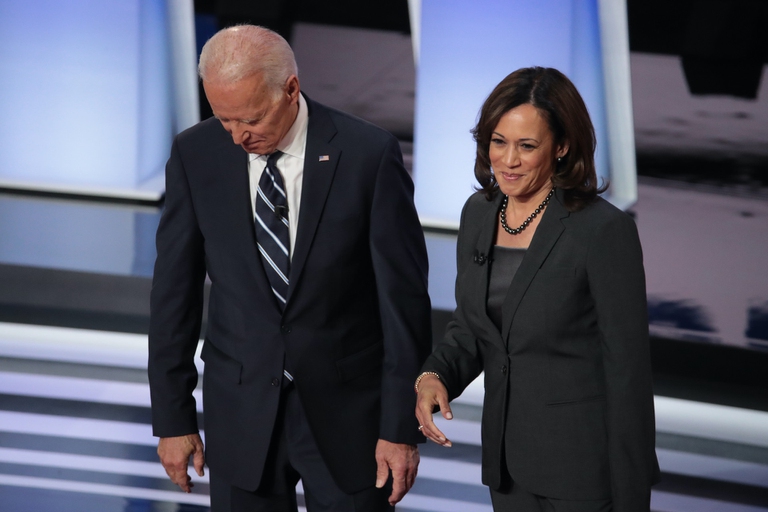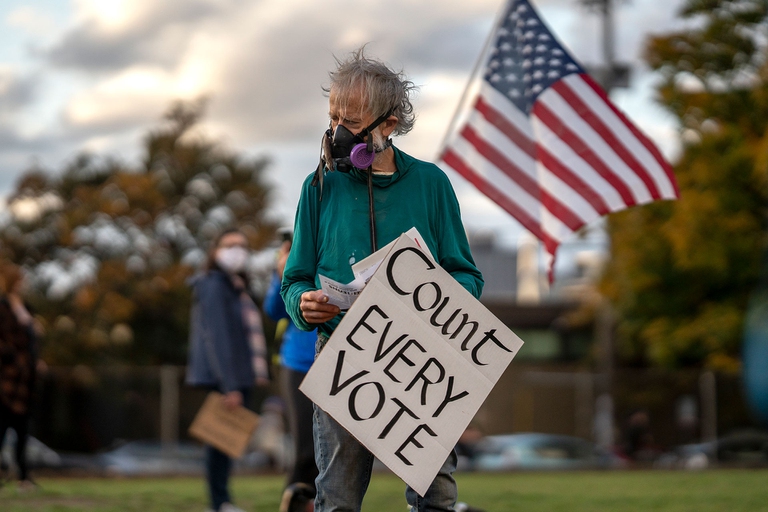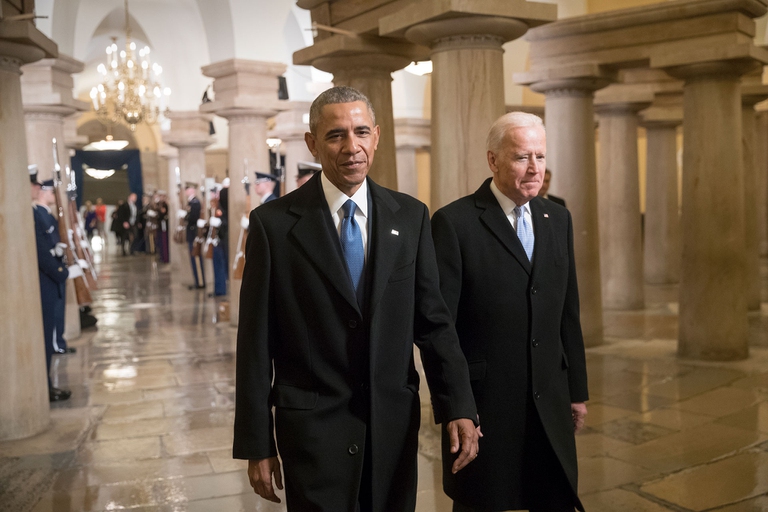
Next stop Washington D.C. A report from the streets of the United States capital on the day of President Joe Biden’s inauguration.
Joe Biden obtained more votes than any other candidate in US election history and is en route to becoming the 46th president of the United States.
After a nail-biting wait, the news has finally come: Joe Biden has been voted president of the United States, obtaining more than the 270 electoral votes needed to win the White House. Donald Trump’s presidency thus comes to a close and so does a chapter that has left its mark on US and world history as a new one begins – though the incumbent is likely to mount a significant challenge to this outcome. Biden has won the 59th presidential election, becoming the nation’s 46th president, one of the most influential leaders in the world, whose decisions will influence all of our futures. His running mate, Kamala Harris, has become the first Black woman to take on the role of Vice President.
“I’m running as a proud Democrat, but I’ll govern as an American president. No red states, no blue states, just the United States. I promise you. I’ll work as hard for those who don’t support me as those who did”. This is the message Biden launched throughout his campaign. If early on he may have fallen somewhat flat for a perceived lack of energy, in his last speeches he’s come to assume the tone of a statesman, juxtaposing his calm and warm persona to Trump’s impetuous and arrogant demeanour.
Unsurprisingly, Biden triumphed on the West Coast, winning in California, Oregon, Washington State, Arizona, Colorado, New Mexico and Nevada, and by a slim margin in Pennsylvania. On the East Coast, he bagged the electoral votes of New York State, Maine, Vermont, New Hampshire, Massachusetts, Rhode Island, Connecticut, New Jersey, Maryland, Virginia and Delaware, the state he represented as senator from 1973 to 2009. He also conquered the District of Columbia (the official name of the capital Washington D.C.), as well as Minnesota, Illinois, Hawaii and key states like Wisconsin and Michigan.
At the national level, approximately 87 per cent of African Americans voted for Biden, according to exit polls, while only 12 per cent voted for Trump. This disparity was even more prominent among African American women, 91 per cent of whom voted for Biden. This data, reported by the Washington Post, is extremely significant in light of the protests that took the US by storm after the murder of George Floyd at the hands of a police officer.
According to CNN, Trump received more votes this year than in 2016 from the Latino community, with a significant impact in some areas. In the state of Arizona, however, Hispanic-Americans voted for Biden two to one. The Democratic candidate was also the one favoured by younger voters, those under thirty, especially in the Midwest.
Biden is the presidential candidate who has obtained the most votes in US history, over 74 million, breaking Barack Obama’s previous record of 69.5 million ballots in 2008. The winner of the 2020 elections won over half of the so-called “popular vote”: this doesn’t automatically lead to victory, which depends more on which states a candidate wins, but the Democrat succeeded on both fronts this time around. Biden’s huge popular vote count is also linked to the extremely high turnout: more than 160 million people voted, equivalent to 66.5 per cent of the voting population. This was the largest turnout since 1908, which goes to show how deeply the American public felt the importance of this election.
The 2020 campaign was unlike any that came before it, occurring for the most part during a global pandemic that has affected the US more than any other country in the world, causing over 200,000 deaths. And the election was also unusual: marked by days of uncertainty, the race being too close to call, and with long hours spent “being patient” as journalists, analysts and the entire world held their breath. When the result finally arrived, everyone reemerged from those depths, with many drawing a sigh of relief. The incumbent president was definitely not among them, and even while results were still coming in he had already started suing states in an attempt to stop ballots from being counted. Trump made baseless claims of electoral “fraud”, casting doubt over the validity of mail-in ballots.
In any case, Trump’s performance in this election was still very good, much better than the polls had predicted. So much so that he announced his victory on election night when it looked like he was ahead. Perhaps a little premature, but it wasn’t out of character for the president. Many Americans wanted him to lead them for a second term.
Let’s talk about Congress. The biennial elections for the House of Representatives took place, with the Democrats holding onto their lead, while Republicans gained some ground. The Senate, meanwhile, is likely to stay under Republican control. It would be the first time since 1989 that a president comes into office without his party having full control of Congress. This could make things very difficult for Biden, undermining his ability to make legislative changes. This is especially true for more progressive or costly policies, such as widening access to healthcare and making steps toward a carbon-neutral future.
It’s likely that representatives of Trump’s party will still try to promote his policies, which are diametrically opposed to Biden’s. This is testament to the deep divisions that still plague the United States, where political polarisation has increased dramatically in recent years. Social inequalities in the country are also profound. On the one hand, the US is home to many of the world’s richest people, the largest tech companies and the wealthiest corporations. On the other hand, it is being ravaged by a homelessness crisis, an opioid epidemic and growing poverty, while its indigenous population is being increasingly marginalised.
On this note, one positive outcome concerning the election is the record number of Native American women elected to Congress. Still, the health emergency has led to hundreds of thousands of job losses and will likely result in an economic crisis of unprecedented scale. Biden has said all citizens should unite under one American identity. Perhaps, there is hope that his presidency could start to repair some of the nation’s wounds.
Joe Biden was born in 1942 in Scranton, Pennsylvania into a modest Catholic family. He obtained a degree in Political Science at the University of Delaware in Newark and a Law degree from Syracuse University in New York State. He passed the bar exam in 1969 and was elected to the Senate three years later. In 2008, he was chosen as vice-president of the United States, and he remained at Obama’s side until 2017. Interestingly, and perhaps unusually for such a successful politician, Biden has suffered from a stutter, which can sometimes be heard in his speeches.
Young climate activist Greta Thunberg openly came out in support of Biden, appealing to the American public to vote for him. “I never engage in party politics. But the upcoming US elections is above and beyond all that. From a climate perspective it’s very far from enough … Just get organised and get everyone to vote Biden,” she tweeted.
As one of his first acts as president, Biden has promised that the United States will rejoin the Paris Agreement, reversing Trump’s decision to abandon the treaty. He has also drawn up a climate plan aimed at promoting climate justice and a clean energy revolution. According to the newly-elected president, the United States can harness its talents and it’s unparalleled capacity for innovation to tackle the threat of global warming while creating opportunities to boost the (clean) energy sector and economic growth hurt by the coronavirus pandemic.
On the topic of human rights, Biden wants every citizen to have the option to choose public, as well as private, healthcare. He also wants to fight the arms lobby, and tackle the racial injustice that has led so many people to protest in recent months. Another goal of his is to fight gender-based violence. Biden also believes that immigration is key to American identity. The hope is that this identity can become more inclusive, and finally start to embrace those parts of the population that feel excluded, giving them the chance to live the American dream.
In the words of writer Daniel Pennac, if we really want to dream, we need to wake up. We have to face problems head-on and try to understand how to solve them together. The masses that have mobilised over issues of race, climate, abortion rights and democracy, or simply to ask for help in this difficult historic moment, have shown that they’re ready. The time to act is now.
Siamo anche su WhatsApp. Segui il canale ufficiale LifeGate per restare aggiornata, aggiornato sulle ultime notizie e sulle nostre attività.
![]()
Quest'opera è distribuita con Licenza Creative Commons Attribuzione - Non commerciale - Non opere derivate 4.0 Internazionale.
Next stop Washington D.C. A report from the streets of the United States capital on the day of President Joe Biden’s inauguration.
With Joe Biden as US president, the entire international community will be aligned on the climate crisis. We can’t let this chance slip away.
With a clearer picture of the results, how have countries across the world reacted to the 2020 US elections? What expectations face president-elect Biden?
From Nepal to Morocco, from Madagascar to Peru, many antigovernamental protests that took place these weeks were led by Gen Z protesters.
We wait, suspended in time, to find out who the next president of the United States will be. The results as they stand show a divided country.
New York holds its breath. A report from our correspondent in the Big Apple on the 3rd of November, the day of the 2020 US elections.
The second black female US senator has become the first black female vice-president. Kamala Harris and Joe Biden have made history.
Joe Biden breaks ahead. Sanders falls but stays in the race. Bloomberg is hanging by a thread. Warren is invisible. The final results of Super Tuesday, a key day in the Democratic primaries to choose the candidate for the the US presidential elections.
The Democratic party primaries in the US started on the 3rd of February. We discuss the five frontrunners, one of whom will challenge Donald Trump for the presidency on the 3rd of November 2020.












